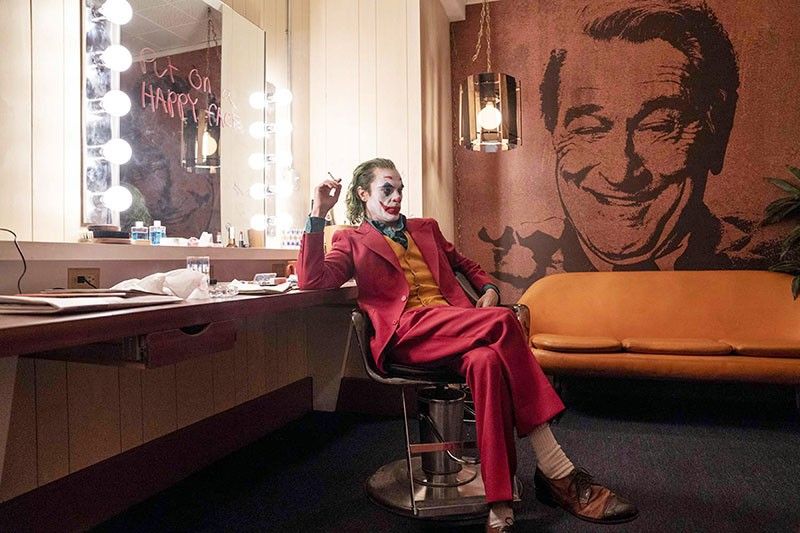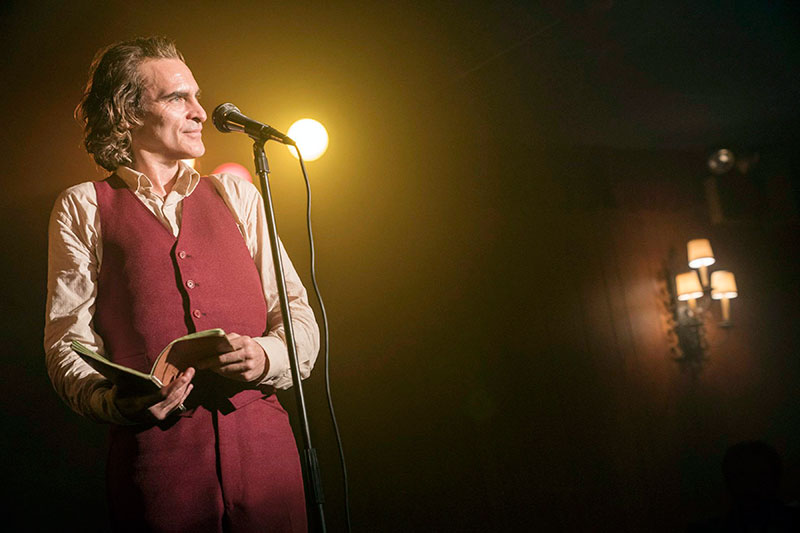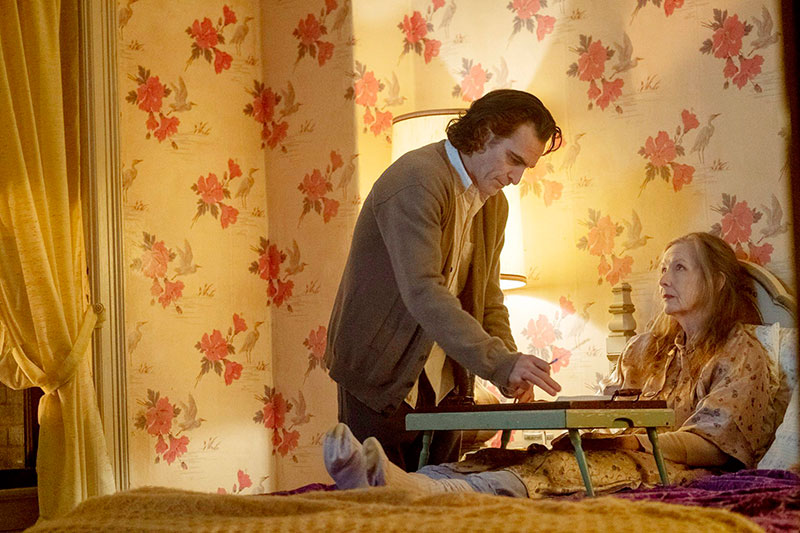Joaquin’s joker is no laughing matter

Even the most primitive societies have an innate respect for the insane.”
That was the line — spoken by Motorcycle Boy (Mickey Rourke) in Francis Coppola’s ’80s teen flick Rumble Fish — that came to mind after watching Joker, Todd Phillips’ reboot of the DC arch-villain origin story.
Departing from the established Batman canon, Joker focuses on Arthur Fleck (Joaquin Phoenix), a fulltime clown and would-be standup comic who just isn’t very funny. He does have a mental condition that spurs inappropriate laughter — a kind of harsh, staccato bark that makes most people around him uncomfortable — and I wondered how much Phoenix was thinking about the way society views people with mental health issues in shaping his performance. The actor shed some 50 pounds for the role, so he also adopts a slithering, serpentine manner, whether he’s sitting and smoking, twisting his limbs into disturbing contortions, or dancing down a city stairwell in full Joker attire.
This isn’t anybody’s pre-existing notion of The Joker. It’s a pure, full-on Joaquin concoction, and you will be haunted by his performance. He’s rebuilt the Joker from the ground up into something we struggle to understand, and struggle even more to watch at times. Yet we sympathize with Fleck, even as we shrink away a bit.

Taking care of his frail mother in a Gotham apartment — set in some vague 1970s-1980s timeframe where trash is piling up on the streets, “super rats” are roaming free, and the locals always seem on the verge of senseless violence or mere anarchy — Fleck struggles with society’s lack of acceptance. He is often self-pitying, but also quite pitiful, whether being set upon by youths in an alleyway, or bombing badly on a local comedy club stage.
His laugh is a giveaway that Fleck is not doing so well in the mental department; frequent visits to a city social worker and copious prescription pill bottles confirm he is not playing with a full deck.
His main goal in life is to follow his mom’s advice: always smile and try to bring laughter to the world. But, like Rupert Pupkin, Robert De Niro’s character in Scorsese’s dark King of Comedy, Fleck just wouldn’t know funny if it bit him with some windup chattering teeth.
Children, notably, are more receptive to Fleck: they see him through non-judging eyes. A child on a subway engages with Fleck — until the kid’s mother chastises him for “bothering” her child. And Arthur appears as a clown at a children’s cancer ward — a gig that’s cancelled after a handgun accidentally falls out of his clown pants.
Joker adopts the gritty flavor of ’70s “lone man” cinema like Scorsese’s Taxi Driver, King of Comedy, Serpico, maybe even Death Wish. It’s the aggrieved, angry young man again, lashing out against the world. Not a great message, perhaps, in an age when far too many aggrieved, angry young men are already lashing out against the world online and elsewhere.

(It’s worth having the “responsibility of art” debate now, even though Joaquin reportedly walked off during a press interview after someone asked if Joker might lead to copycat behavior. Sometimes movies do have unfortunate resonance among unstable minds — see, for instance, John Hinckley’s attempted assassination of Ronald Reagan in 1981, sparked by an unhealthy obsession with Jodie Foster and De Niro’s role in the Scorsese movie Taxi Driver.)
Though director Phillips shifts convincingly here from Hangover bro comedies to crafting what is easily the darkest DC entry yet, the play of light and heavy in Joker is way out of balance, and the tone of the film suffers. There are a few sight gags, meant to show that Fleck is inadvertently amusing, whether it’s the way he schleps around in Chaplinesque clown shoes when chasing after his teen attackers, or the sight of his lapel flower bursting with red fluid as he’s lying, beat-up, in an alleyway. But this is grim going at times; the only real laugh I encountered was when Fleck’s dwarf co-worker, eager to escape an apartment where something bad has just happened, asks for Fleck’s aid in opening the chain lock to let him flee. Joker could have used more ironically funny moments like that.
Because, let’s face it, residing inside Arthur Fleck’s mind for two hours is no picnic. He needs proper medical care, not the perfunctory social services of a cash-starved city like Gotham. And, as we know from the DC universe, Arkham Asylum is not the place where minds are cured, but rather a hotbed for criminally insane plotting.
Starting as a detailed, often unpleasant character study, Joker hovers, for the first 40 minutes or so, on the precipice of despair and deep discomfort — then it almost becomes something else. As Fleck lashes out, he begins to embrace his inner evil clown, and the whole thing promises to shift into something transcendent. The moment when Phoenix stands blood-spattered in clown makeup before a bathroom mirror after a subway attack, raising his head to the heavens, weaving his limbs in a sinewy ballet of righteous payback, is perhaps the most disturbing, yet beautiful, image in the movie. Later, we see him as the Joker, dancing down a stairwell, cigarette a-puffing: this is what joy feels like.
And then it goes back to schmucky Fleck, descending into his journey of self-discovery, finding out how or if he’s related to would-be mayor Thomas Wayne, and the movie heads back into despair again.
Random explosions of violence make it harder for Joker to inject much humor. Though DC does, by its nature, tend to be darker than Marvel’s plucky hero origin stories, the violence here is way beyond their usual offerings, even Suicide Squad. (So, leave the kiddies at home.)
It’s debatable how much Fleck actually imagines and how much is real — another nod to King of Comedy — and De Niro himself shows up as a local TV host who callously ridicules Fleck by airing a video of his comedy club act, then inviting him on the show for further abuse. There’s a scene where Fleck practices how he’ll one day greet De Niro onstage, and it echoes the fantasies of Rupert Pupkin, trying to get his five minutes of fame on The Jerry Langford Show. Joker routinely shifts in and out of Fleck’s unreliable reality; we’re not even sure if he actually has a thing going on with his neighbor, single mom Zazie Beetz, who smiled at one of his jokes.
That’s part of Joker’s design, to leave our feelings about Fleck ambiguous. Is he just crazy? Deeply sympathetic? Is violence a reasonable response to the pain he suffers? As in many Batman-related movies, Gotham itself is treated as a damaged character, a dysfunctional Greek chorus: here, it percolates with socioeconomic rage, building up to a massive explosion. It eventually comes to mirrors Fleck’s mental condition, in alarming ways.
Yet little evidence of the gleeful “criminal mastermind” that Joker is said to be emerges until the final scenes of the film, where we see that Gotham really is as crazy and anarchic as Fleck has led us to believe, and that he could be the messiah of all this chaos: a man for the times. This is, after all, an origin story, so it’s fitting that we leave Fleck just as he metamorphosizes into his ultimate creation.
As Gotham breaks down, another line, predating Motorcycle Boy, came to mind: “The greatness of a nation can be judged by how it treats its weakest member.” That one’s from Gandhi. Gotham is clearly a city that places little value on the weak and downtrodden. But full-blown crazy? That’s a party to them. Innate respect for the insane, indeed.
Ultimately, Joker would have benefited from a less slavish attention to period detail and more focus on the humor inherent in its subject, even if it’s dark humor. A little less Fleck, and a bit more Joker, would have helped this bitter pill go down easier.















